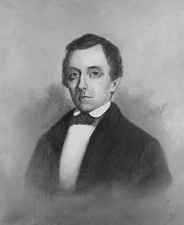
A gubernatorial election was held in New York from April 29 to May 1, 1783. George Clinton, the incumbent governor, defeated Philip Schuyler, the surveyor general, and Ephraim Paine, the senator from the middle district.

The 1851 Pennsylvania gubernatorial election occurred on October 14, 1851. Incumbent governor William F. Johnston, a Whig, was a candidate for re-election but was narrowly defeated by Democratic candidate William Bigler.

The 1854 Pennsylvania gubernatorial election occurred on October 10, 1854. Incumbent governor William Bigler, a Democrat, was a candidate for re-election but was defeated by Whig candidate James Pollock.

The 1857 Pennsylvania gubernatorial election occurred on October 13, 1857. Incumbent governor James Pollock, a Whig, was not a candidate for re-election. Democratic candidate William F. Packer defeated Republican candidate David Wilmot and American Party candidate Isaac Hazlehurst to become Governor of Pennsylvania.

The 1855 Alabama gubernatorial election was held on August 6, in order to elect the governor of Alabama. incumbent governor John A. Winston won his second term as governor.

The 1819 Alabama gubernatorial election was held on September 20–21, 1819, to elect the first governor of Alabama. Democratic-Republican candidate William Wyatt Bibb defeated fellow Democratic-Republican candidate Marmaduke Williams with 53.82% of the vote. The debate over where Alabama's permanent capital should be was reportedly an important issue in the race - Williams supported Tuscaloosa while Bibb proposed Cahawba. After the election, Cahawba was made capital, but it was moved to Tuscaloosa in 1825.

The 1860 Connecticut gubernatorial election was held on April 2, 1860. Incumbent governor and Republican nominee William Alfred Buckingham defeated former governor and Democratic nominee Thomas H. Seymour with 50.30% of the vote.

The 1858 Massachusetts gubernatorial election was held on November 2. Incumbent Republican governor Nathaniel Banks was easily re-elected to a second term in office, beginning a period of Republican dominance which would extended into the 1870s.

The 1859 Massachusetts gubernatorial elections was held on November 2. Incumbent Republican governor Nathaniel Banks was easily re-elected to a third term in office in a race featuring three governors of Massachusetts: incumbent governor Banks, former governor George Nixon Briggs (1844–51), and future governor Benjamin Franklin Butler (1882–83).

The 1795 Delaware gubernatorial election was held on October 6, 1795.

The 1804 Delaware gubernatorial election was held on October 2, 1804.

The 1807 Delaware gubernatorial election was held on October 6, 1807.

The 1810 Delaware gubernatorial election was held on October 2, 1810.

The 1813 Delaware gubernatorial election was held on October 5, 1813.

A gubernatorial election was held in Maine on September 14, 1840. The former mayor of Bangor Edward Kent, the Whig nominee, defeated the incumbent governor John Fairfield, the Democratic nominee.

A gubernatorial election was held in Massachusetts on September 4, 1780. John Hancock, the former delegate to the Continental Congress from Massachusetts, defeated James Bowdoin, the former president of the Massachusetts Constitutional Convention. The election took place against the backdrop of the American Revolutionary War, in which Hancock briefly participated as a major general of the Massachusetts militia. Hancock became the first governor elected under the Constitution of Massachusetts, ratified only the previous June; prior to the election, the Massachusetts Governor's Council administered the government following the removal of the last royal governor.

A gubernatorial election was held in Massachusetts on April 2, 1781. John Hancock, the incumbent governor, defeated James Bowdoin, the former president of the Massachusetts Constitutional Convention.
A gubernatorial election was held in Massachusetts on April 7, 1783. John Hancock, the incumbent governor, was re-elected, with only token opposition.
A gubernatorial election was held in Massachusetts on April 5, 1784. John Hancock, the incumbent governor, was re-elected, with only token opposition.

A gubernatorial election was held in Massachusetts on April 3, 1786. James Bowdoin, the incumbent governor, defeated John Hancock, the president of the Confederation Congress.

















